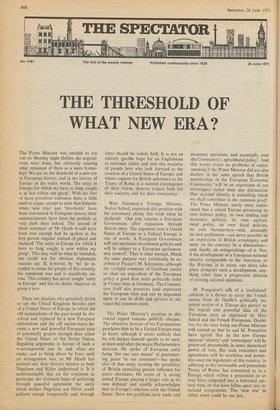THE THRESHOLD OF WHAT NEW ERA?
The Prime Minister was entitled to cry out on Monday night (before the negotia- tions were done, but obviously treating what remained of them as a mere forma- lity) `We are on the threshold of a new era in European history, and in the history of Europe in the wider world. The unity in Europe for which we have so long sought is at last within our grasp'. With the first of these grandiose sentences there is little need to argue, except to note that hitherto when 'new eras' and `thresholds' have been announced in European history their announcements have been the prelude to very dark days indeed. The second of these sentences of Mr Heath would have been true enough had he spoken in the first person singular instead of plural and declared `The unity in Europe for which I have so long sought is now within my grasp'. This may well be what he intended, but could not for obvious diplomatic reasons say. If, however, by `we' he in- tended to mean the people of this country, his statement was and is manifestly un- true. This country has never sought `unity in Europe' and has no desire whatever to grasp it now.
There are idealists who genuinely desire to see the United Kingdom become part of a United States of Europe in which the old nationalisms of the past would be dis- solved and replaced by a new European nationalism and the old nation-states be- come a new and powerful European state of potentially greater strength than either the United States or the Soviet Union. Beguiling arguments in favour of such a re-arrangement can be and often are made: and to bring about by force such an arrangement was, as Mr Heath has pointed out, their historic mission as both Napoleon and Hitler understood it. It is understandable that on the continent in particular the visionary hope of achieving through peaceful agreement the unity which neither Napoleon nor Hitler could achieve except temporarily and through force should be widely held. It is not an entirely ignoble hope for an Englishman to entertain either: and that tiny majority of people here who look forward to the creation of a United States of Europe, and whose support for British adherence to the Treaty of Rome is a natural consequence of their vision, deserve respect both for their sincerity and for their consistency.
West Germany's Foreign Minister, Walter Scheel, expressed this position with his customary clarity this week when he declared: `Our aim remains a European Government after expansion through British entry. The argument over a United States of Europe or a Federal Europe is one of words. A European Government will take decisions on common policies and will be subject to a European parliamen- tary control'. That is clear enough. Much the same purpose may confidently be as- cribed to France's M. Schumann, although the vestigial remnants of Gaullism render so clear an exposition of the European policy a good deal more politically risky in France than in Germany. The Commis- sion itself also possesses (and expresses) the European view and can be depended upon to use its skills and powers to ad- vance the common cause.
The Prime Minister's position in this crucial regard remains publicly obscure. The obseSsive fervour of his Europeanism proclaims him to be a United Europe man at heart; although it seems unlikely that he will declare himself openly to be such, at least until after the major Parliamentary decision. He spoke of European unity being `the one sure means' of guarantee- ing peace 'in our continent'—but spoke also of that unity creating the possibility of Britain exercising greater influence for peace elsewhere. He treats of 'a strong united Europe playing a larger role in its own defence' and readily acknowledges that in Europe's relations with the United States `there are problems over trade and monetary questions, and essentially over the Community's agricultural policy'. And this would create no problems of under- standing if the Prime Minister did not also declare in the same speech that British membership of, the European Economic Community 'will be an expression of our sovereignty rather than any diminution. Our national identity is something which we shall contribute to the common good'. The Prime Minister surely must under- stand that a united Europe possessing its own defence policy, its own trading and monetary policies, its own agricul- tural policy, its own fiscal policies, its own bureaucracy—and, assuredly its own parliament—can never possibly be an expression of British sovereignty and must on the contrary -be a diminution— and, finally, an extinguishing—of it. Nor, if the development of a European national identity comparable to the American or the Russian, is to occur, can there take place alongside such a development, any- thing other than a progressive dilution of existing national identities.
M. Pompidou's talk of a `confederal' solution is a device to carry the French across- from de Gaulle's politically im- potent notion of a 'Europe des ponies' to the logical and powerful idea of the European state as expressed by Herr Scheel and the French Europeans. Doubt- less for the time being our Prime Minister will remind us that he and M. Pompidou have agreed that in the new Europe national `identity' and `sovereignty' will be preserved presumably in some theoretical power of veto. But such reminders and agreements will be worthless and power- less once the legislature of this country. in adhering to the irrevocable and permanent Treaty of Rome, has committed us to a Europe which within a generation or so may have congealed into a federated uni- tary state, or else have fallen apart into its natural components. The `new era' in either event could be our last.






 Previous page
Previous page